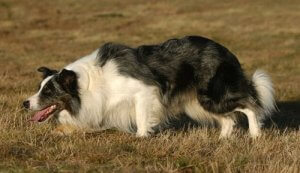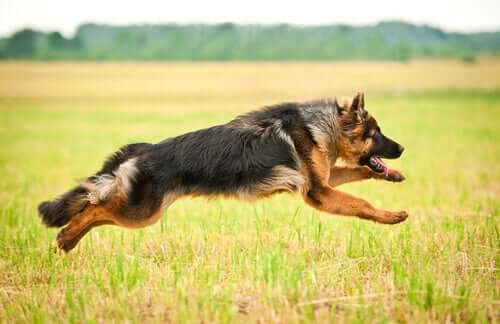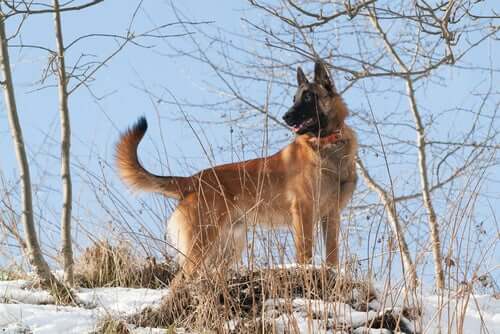The Seven Main Breeds of Herding Dogs

What types of herding dogs exist?
When it comes to herding dogs, there are two types. The first are those that control and move herds, and the second protects animals from predators (such as wolves). The 7 main breeds of herding dogs are:
1. The German Shepherd
This is the most well-known breed of herding dogs and it’s responsible for caring for flocks of sheep. Its origin goes back to Germany in the year 1899, although today there is also an American line. The American line has different physical characteristics and a calmer temperament.
The German Shepherd is a very intelligent, energetic, loyal dog that is easy to train and make obedient. With great physical and mental strength, these dogs are ideal for guiding farm animals in the fields. It’s also common for German Shepherds to work as army and police dogs.

2. The Old English Sheepdog
This is a beautiful canine bred in Great Britain to care for herds of sheep as well as cows. They are resistant to cold climates and are playful and docile animals. Ideal for environments with children, these dogs make for great companions. However, if they become bored, they tend to become destructive.
The Old English Sheepdog can weight up to 200 lb. and measure up to 28 inches at its withers. It has a deep bark, and their fur requires special care.
3. The Australian Sheepdog
Contrary to what its name implies, this breed actually developed in northern Spain. When it emigrated later to Oceania, it became one of the most popular herding dogs. The popularity of Australian Sheepdogs increased even more following World War II in the west of the United States, where they worked as ranch dogs.
The Australian Sheepdog is very energetic and dynamic. Due to its strong work instincts, these canines need to stay busy. They can be great family companions, especially when there are children. They are medium in size, and their coats can be black, red, red merle, or blue merle. Because of their light blue eyes, they are also known as “ghost eye dogs”.
4. The Catalan Sheepdog
Native to the Catalan Pyrenees, the “Gos d’atura Catalá” is another popular European herding dog. This breed weighs approximately 44 lbs. and is about 22 inches high. It’s an excellent option when it comes to herding due to its docility, obedience, and bravery. And, of course, because of its ability to guide herds. What’s more, Catalan Sheepdogs are playful, affectionate, and can carry out a number of farm tasks.
5. The Border Collie
The Border Collie is one of the most popular herd dogs all over the world. It’s able to direct any farm animal and needs to be constantly active. One of the greatest virtues of this breed is its intelligence. It also stands out for its affection, kindness, and companionship. It’s an ideal pet for families that love enjoying outdoor activities.
6. The Briard
This is one of the oldest French breeds. The first mention of the Briard occurred in 1809 when it was created to be a working dog. Briards have worked as guard dogs, rescue dogs, and even as guide dogs. Their ability to work is amazing, and they can herd up to 700 animals. Today, however, they are most popular as canine companions.
These dogs are very rustic, energetic, stubborn, cheerful, intelligent, and sensitive. They need training in order to live with other dogs. As for their appearance, they have an abundant amount of long, mustache-like hair on their faces. It’s important to brush their hair, but not shear it. Their hair can be black, brown, or grey.

7. The Belgian Shepherd
The last on our list of herding dogs is one that comes in four different varieties. Each one has the ability to learn very quickly. The Belgian Shepherd is the perfect animal for caring for and protecting flocks of sheep. They prefer to be outdoors and need plenty of daily exercise and play.
Source of main image: Jean-Michel Castelan
What types of herding dogs exist?
When it comes to herding dogs, there are two types. The first are those that control and move herds, and the second protects animals from predators (such as wolves). The 7 main breeds of herding dogs are:
1. The German Shepherd
This is the most well-known breed of herding dogs and it’s responsible for caring for flocks of sheep. Its origin goes back to Germany in the year 1899, although today there is also an American line. The American line has different physical characteristics and a calmer temperament.
The German Shepherd is a very intelligent, energetic, loyal dog that is easy to train and make obedient. With great physical and mental strength, these dogs are ideal for guiding farm animals in the fields. It’s also common for German Shepherds to work as army and police dogs.

2. The Old English Sheepdog
This is a beautiful canine bred in Great Britain to care for herds of sheep as well as cows. They are resistant to cold climates and are playful and docile animals. Ideal for environments with children, these dogs make for great companions. However, if they become bored, they tend to become destructive.
The Old English Sheepdog can weight up to 200 lb. and measure up to 28 inches at its withers. It has a deep bark, and their fur requires special care.
3. The Australian Sheepdog
Contrary to what its name implies, this breed actually developed in northern Spain. When it emigrated later to Oceania, it became one of the most popular herding dogs. The popularity of Australian Sheepdogs increased even more following World War II in the west of the United States, where they worked as ranch dogs.
The Australian Sheepdog is very energetic and dynamic. Due to its strong work instincts, these canines need to stay busy. They can be great family companions, especially when there are children. They are medium in size, and their coats can be black, red, red merle, or blue merle. Because of their light blue eyes, they are also known as “ghost eye dogs”.
4. The Catalan Sheepdog
Native to the Catalan Pyrenees, the “Gos d’atura Catalá” is another popular European herding dog. This breed weighs approximately 44 lbs. and is about 22 inches high. It’s an excellent option when it comes to herding due to its docility, obedience, and bravery. And, of course, because of its ability to guide herds. What’s more, Catalan Sheepdogs are playful, affectionate, and can carry out a number of farm tasks.
5. The Border Collie
The Border Collie is one of the most popular herd dogs all over the world. It’s able to direct any farm animal and needs to be constantly active. One of the greatest virtues of this breed is its intelligence. It also stands out for its affection, kindness, and companionship. It’s an ideal pet for families that love enjoying outdoor activities.
6. The Briard
This is one of the oldest French breeds. The first mention of the Briard occurred in 1809 when it was created to be a working dog. Briards have worked as guard dogs, rescue dogs, and even as guide dogs. Their ability to work is amazing, and they can herd up to 700 animals. Today, however, they are most popular as canine companions.
These dogs are very rustic, energetic, stubborn, cheerful, intelligent, and sensitive. They need training in order to live with other dogs. As for their appearance, they have an abundant amount of long, mustache-like hair on their faces. It’s important to brush their hair, but not shear it. Their hair can be black, brown, or grey.

7. The Belgian Shepherd
The last on our list of herding dogs is one that comes in four different varieties. Each one has the ability to learn very quickly. The Belgian Shepherd is the perfect animal for caring for and protecting flocks of sheep. They prefer to be outdoors and need plenty of daily exercise and play.
Source of main image: Jean-Michel Castelan
This text is provided for informational purposes only and does not replace consultation with a professional. If in doubt, consult your specialist.








